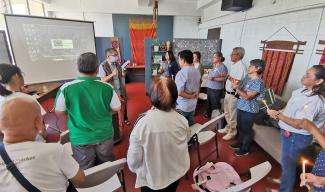To protect the region Meru Betiri from deforestation and degradation to increase carbon stocks, a group of farmers namely Mekarsari from the village Curahnongko (sub-district Tempurejo, Jember). With 17 other groups formed an organization called Farmers Group Network Rehabilitation (Jaketresi) take a part in the rehabilitation zone National Park (TN) in Meru Betiri Jember.
The activities in the rehabilitation zone with a community-based agroforestry development model are aimed at improving biodiversity and environmental services, so that the region Meru Betiri is protected by the people from deforestation and degradation to increase carbon stocks. At the same time the model is also used as a media trial that should cause incentives as compensation for the utilization of environmental carbon services with the Plan Vivo scheme (Payment for Environmental Services, aka PES).
The agroforestry model is carried out in 10 hectares in Curahnongko village by Mekarsari group with a membership of 60 people. 3000 seeds were planted on the 10 hectares of land with 6 types of crops of the farmers choice, namely: banana, avocado, durian, kedawung, jengkol and jackfruit. These crops were chosen because it has both conservational and economic value, as they are considered easy to breed. The Mekasari group was assisted by four chairmans of the group that is incorporated in the 'Jaketresi', which were selected according to agreed criteria.
The organizer of TN Meru Betiri gives his appreciation and support to the development of the model. It is the proposition of the farmers to plant more plants species. During this period they receive assistance of Meru Betiri and other agencies, as the farmers were given information about locations to plant, understandings about the seeds and the necessary types of seeds. Now farmers get the difference between planting without proper management and a jointly managed participatory planting process with donations.
There was a group meeting with officers four days prior to the distribution of the seeds. The meeting's goal was to socialize and to quickly divide the means and methods of planting seeds in the context of land rehabilitation. The farmers agreed on criteria for a strategic location of planting the seeds that is easily accessible. The seeds are packaged, a name is written along with a signature and a thumb print as authentic evidence that they have taken a ration of seeds and can then be used as a reference for monitoring.
For the implementation of the 'PES Trial' funds are available of Rp 3,000 per-seed. As proposed by the farmers the funds is awarded in two stages. The first stage of the funds is awarded when planting the seeds commences, with a nominal of Rp 1000 per-seed. The second stage is after the verification that the seeds have been planted, some two months after planting, with a nominal of Rp 2,000 per seed.
"Before the planting process there are a number of activities that have to be carried out such as the selecting of farmers participating in the program, selection of plants, determining the location, learning plant breeding, monitoring, evaluation and verification as well as mentoring. If these activites are also implemented by all agencies when there is investment to respond to adaptation and mitigation of climate change, then it is likely the growth rate of plants can also develop well, "said Nurhadi, Director of KAIL-Sustainable Natural Conservation of Indonesia an institution that assists in the development of the PES Trial in this region.
The PES Trial model development has provided a new approach to motivate people to plant breed. In this context, farmers do not just grow plants. They do not only want the fruits from the trees, but they now too want to optimize the production and absorb the carbon contained in the plant, in order to gain environrmental benefits. Planting should be right in the rainy season so that the soil is ready to receive the roots and ensure good growth.




